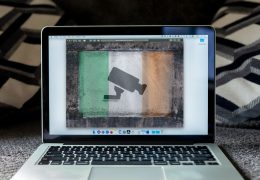Minister for Justice Ducks Questions on Number Plate Surveillance Scheme
The Minister for Justice, Equality and Law Reform was recently asked about the privacy implications of Garda plans to introduce cameras to record details of the number plate of every passing car. However, the Minister’s response doesn’t answer the questions asked and leaves us still in the dark about the use and possible abuse of this technology. Full details follow.
On New Year’s Eve last, details emerged that the Gardaí were planning to introduce an Automatic Number Plate Recognition System – ANPR for short. This system would, it was reported, be installed in Garda Traffic Corps cars and would automatically scan the number plates of all passing traffic, looking up the details of each number plate. According to the Irish Times: “any vehicles which are not taxed or insured or which have been reported stolen will trigger a warning notice on an in-car computer screen. A warning will also be triggered for cars which have not passed the National Car Test (NCT) or which have any other outstanding infringement.”
This concerned us at the time, as it followed UK plans to introduce mass surveillance using ANPR. Simon McGarr pointed out that:
This Automatic Number Plate Recognition system hasn’t just been dreamt up in Harcourt St. It follows hot on the heels of the announcement of a seemingly identical system in the UK.
Reported on the 22nd December 2005 in the London Independent, the British are less reticent about the extra abilities this Automatic Number Plate Recognition will give the police, and what they intend to do with it. While the Irish Times might have left you with the impression that they’ll just be on the lookout for NCT dodgers and car thieves the Independent seems to have a fuller picture of the planned uses.
Here is the big picture:
“Using a network of cameras that can automatically read every passing number plate, the plan is to build a huge database of vehicle movements so that the police and security services can analyse any journey a driver has made over several years… These will include time, date and precise location, with camera sites monitored by global positioning satellites.”
And unlike the unthreatening Irish suggestion of just sticking cameras in the front and back of Garda cars, the UK have pointed out that they will also be linking the thousands of public and private CCTV cameras in towns, supermarkets, petrol stations and on the roads into the system.
“’What the data centre should be able to tell you is where a vehicle was in the past and where it is now, whether it was or wasn’t at a particular location, and the routes taken to and from those crime scenes.’ says Mr Whiteley, Chief Constable of Hertfordshire and chairman of the Acpo steering committee on automatic number plate recognition (ANPR).”
The UK police force is more honest about its intentions, at least. After all, if the plan is to track every citizen as they go about their business and record their movements by way of CCTV and then store that information for years it will only work properly if the surveillance is ubiquitous. If this is the intention of the Garda Síochána also, it is a major infringement of the public’s right to privacy.
There are also other problems with this technology. I’ve already pointed out that in the US, where systems like this have been in place for some time, it’s common for police to look up the details of an attractive woman in a passing car – known as running a plate for a date. There have also been problems in England with police abusing car registration databases for their personal benefit.
We asked Joe Costello TD whether he would table a parliamentary question asking the Minister about these Garda plans. He was kind enough to do so (via his colleague Jan O’Sullivan) and the following is the result. I have divided the question and answer into individual parts for ease of reference. Our comments on each part are in brackets.
Ms O’Sullivan asked the Minister for Justice, Equality and Law Reform:
1. The status of the proposed new automatic number plate recognition system reported in a newspaper (details supplied) of 31 December 2005;
A: “I am informed by the Garda authorities that they are currently carrying out an impact assessment in respect of the use of an automatic number plate recognition system by the Garda Síochána. This assessment includes the nature of the impact on current information technology systems within the force.”
2. The consultations which will be carried out before a decision will be made on its introduction or if a decision has already been made; the consultations which were carried out before the decision was taken;
A: “As part of their consideration of whether to procure such a system, I am informed by the Garda authorities that they will also consider the question of consultation with a range of interested parties and how such consultations would take place.”
[It is astonishing that there is no commitment to consult before this technology would be introduced. Nor are there any details of who would count as interested parties. Will they be more than vendors of ANPR systems?]
3. If the Data Protection Commissioner has been consulted on this plan; if not, the reason for such a failure to consult;
A. “I can assure the Deputy that all relevant legislation, including data protection legislation, will be complied with in the event of a decision being made to acquire any such system.”
[We can infer that there has been no consultation with the Data Protection Commissioner to date, nor is there any planned.]
4. If there have been discussions within either his Department or the Garda Síochána to connect this system to closed circuit televisions other than those in police vehicles;
A: “I am further informed that consideration is not being given to connecting any such system to closed circuit television in non-police vehicles.”
[This fails to answer the question asked. We are concerned about this system being connected to other cctv systems, such as those operated by the National Roads Authority, or private systems. The answer only mentions cctv in “non-police vehicles”. But this leaves room to connect it to other cctv systems, which aren’t in vehicles. That is, all of them. This answer leaves it open for the Gardaí to extend the system to include, for example, cctv systems at tollbridges or petrol stations.]
5. If it has been proposed, discussed or considered to have the time and location details of all number plates recognised by the system stored in a database;
A: “nor has there been any consideration of whether to have the time and location details of all number plates recognised by the system stored in a database.”
[This is the major point of concern for this system. It ought to have been considered by now. Note that the answer doesn’t rule out such storage.]
6. If it has been so proposed, discussed or considered; the length of time it has been discussed, proposed or considered that these details should be retained;
[Moot, see above]
7. If the system as currently proposed will include an audit trail recording which looked up which number plate and when;
A: “It is envisaged that any such system would include an electronic audit trail recording the specific number plates identified through the system.”
[This would be a welcome development if it ensured that Gardaí could be disciplined where they look up number plates for their private purposes.]
8. If the system as currently proposed is subject to independent auditing on a systematic and regular basis;
A: [Ignored. Presumably we can take this as a no. This undermines the answer to the previous question – without auditing of the use of the system, individual Gardaí can feel free to abuse it safe in the knowledge that there is no mechanism for detecting abuse.]
9. His views on whether the system as currently proposed will be in contravention with the recommendations of the Law Reform Commission in its Report on Privacy, Surveillance and the Interception of Communication;
A: [Ignored. The Law Reform Commission made strong recommendations on surveillance and safeguards in its comprehensive 1998 Report on Privacy. The current Minister has been happy to cite that report to justify imposing new privacy rules on the media. However, what is sauce for the goose is evidently not sauce for the gander, and the recommendations limiting state surveillance of citizens have simply been ignored.]
10. If so, the reason he believes this is necessary; if not, the reason for same;
A: [Ignored. ]
11. If he proposes bringing enabling legislation before the Houses of the Oireachtas to ground this project in law and allow for a full debate on its cost, resource and privacy implications.
A: “Any proposal to procure such a system, when actually made by the Garda authorities, will be considered by my Department.”
[I.e. there will be no legislation and no opportunity for public scrutiny.]
Number plate recognition has legitimate uses. But these answers do nothing to address the fear that this technology can be used for mass surveillance of the innocent, along the lines of the system recently introduced in England. We have, therefore, now written to the Gardaí asking to be included in any consultations which take place. We have also written to the Data Protection Commissioner outlining our concerns and asking that the Commissioner monitor this project.


